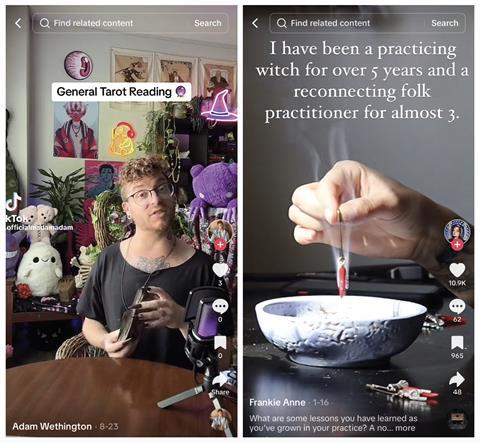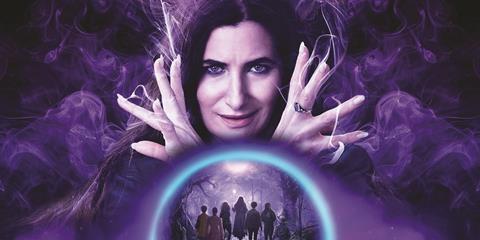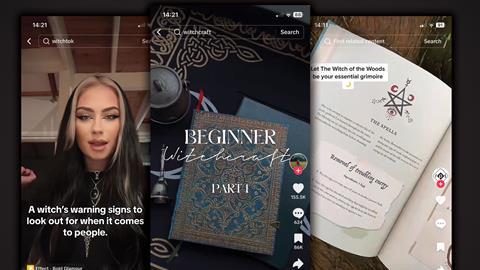Millions of young people are diving headfirst into exploring witchcraft, and their main portal is the social media app TikTok. Martin Saunders looks at what’s going on, and suggests how Christians can address this dangerous trend
What image springs to mind when you read the word ‘witch’? Putting aside the discomfort you might feel about the term, if you allow your mind’s eye to wander, you’re likely to picture a woman in black. She’s probably elderly, with a pointy hat, green-eyed cat by her side and a broomstick. Perhaps you jump to a cultural reference point: the witches of Oz or Eastwick, or Roald Dahl’s terrifying coven. Maybe you remember Jill Murphy’s The Worst Witch. All of those characters and images share a similar idea: a small band of very ‘special’ women who’ve tapped into spiritual powers and attempt to wield them for good or ill. Traditionally, that’s what the word ‘witch’ has tended to, ahem, conjure up.
Not anymore. The 2020s have given witchcraft a radical makeover, and taken it from the fringes of the rare, quirky individual to the mainstream. Young people – millions of them – are diving headfirst into exploring witchcraft, and their main portal is the social media app TikTok. Crystals, tarot cards and spell-casting rituals have become part of mainstream youth culture, turning a niche spiritual practice into a global phenomenon. Feelings of moral panic are inevitable; welcome to the strange and somewhat worrying world of ‘WitchTok.’
Social media influencers are mixing magical practices and make-up tutorials
You’ll be forgiven for feeling uncomfortable. The Bible includes quite a few witch-and-wizard characters, and the story never casts them in a positive light. As believers in a spiritual dimension, we might reasonably hold concerns that youth culture is dabbling en masse in dangerous forces that it doesn’t understand. Yet at the same time, this is an apparent swing towards spiritual hunger in a generation we often think of as spiritually detached. Does the rise of interest in witchcraft create a unique opportunity to engage with what’s clearly a deep and growing hunger for spiritual connection? Because, whether we like it or not, there’s definitely something brewing.

Let me take a spell-fie
Witchcraft has undergone a serious PR makeover. Gone are those pointy hats, cats and broomsticks, unless they’re being utilised ironically. Today’s witches are social media influencers, mixing magical practices and make-up tutorials in their content-cauldrons. Frankie Castanea, otherwise known as Chaotic Witch Aunt, Adam Wethington and Kiley Mann aren’t household names, yet their content is spreading like enchanted wildfire. TikTok videos featuring the hashtag #WitchTok have amassed a staggering 69 billion views.
For the most part, in the same way influencers promote beauty products, young witches on TikTok are promoting spell kits and teaching their followers how to manifest love, banish negativity or cleanse a space. As well as instructions on how to create the perfect Halloween look, or opining about the power of certain herbs, WitchTok is also about connecting with others who share your view of the universe. With many young people suffering from the epidemic of loneliness and social exclusion – ironically brought on in part by the advent of social media – it offers a virtual gathering space to meet with like-minded people.
WitchTok may provide a seemingly innocuous introduction to a very superficial version of witchcraft, but it can be a pathway to a genuine spiritual practice. Online, young witches can connect with others who share their beliefs, forming digital covens and offering each other advice and encouragement. It’s in this context that a young person might begin to veer towards the occult.
If you’re searching for some kind of communal experience, something to put your faith in, witchcraft can feel alluring because it doesn’t require any sort of doctrinal commitment. You can hold a belief in the universe, energy or mother nature without the perceived judgement or rigid boundaries often associated with religion. Just as with church, people come intrigued but stay for community and, in that context, can end up entering into a deeper version of the ‘faith’. So, though it’s certainly not true in all – or even a majority of – cases, what begins in curiosity can lead to something much more dangerous.

Enter Agatha
At the same time as this online groundswell of interest in witchcraft, Hollywood has been making moves in a similar direction. Mainstream film and television releases have recently featured an unusually strong focus on witches that has either complemented or helped to inspire greater interest in darker forms of magic. Prominent in this trend is the reboot of noughties kids show Sabrina the Teenage Witch as a darker Netflix horror series called Chilling Adventures of Sabrina. In it, the titular character is torn between two worlds, navigating an American high school while discovering her witch heritage, the latter proving an empowering alternative to the mundanity of the former.
Then, most recently, like Saul visiting the witch of Endor (see box), the ailing Marvel Cinematic Universe has sought out a witch to try to revive its flagging fortunes. The Disney+ series Agatha All Along centres on Kathryn Hahn’s power-stripped villain, who forms a coven that she hopes will enable her to return to former glories. In this show, witches and their magic are dark, sexy and powerful; there’s barely a man in sight, because they don’t seem necessary. Agatha is mischievous and enigmatic, but her key characteristic is her control-freakery. She seeks power not so that she can take over the world, but so she can regain the autonomy that she’s lost.
And perhaps that’s exactly the point. Witchcraft isn’t just popular among young people because it’s cool. Its allure lies in the promise of control; of being able to shape one’s own destiny. For many young people, the world often feels utterly uncontrollable. The last few years have been filled with pandemics, climate anxiety, war and economic instability. These aren’t small issues, and they leave people feeling overwhelmed, powerless and anxious about their futures. There’s plenty of aesthetic appeal to crystals, candles and moonlit rituals, but one major reason why young people are embracing witchcraft is that it promises the illusion of order in an increasingly chaotic world.
Spells, rituals, chants and objects such as chargeable crystals give young people a sense that they’re able to influence the world around them. It’s not hard to see why that would be attractive in the wilderness of the 2020s.
A Christian response
You may feel I’ve been a little blasé thus far, so let’s be clear: scripture takes a very strong stance on witchcraft. Deuteronomy 18:10-11 says: “Let no one be found among you who sacrifices their son or daughter in the fire, who practises divination or sorcery, interprets omens, engages in witchcraft, or casts spells, or who is a medium or spiritist or who consults the dead.” Moses calls these things “detestable practices” (v12) and clearly, they’re enough to turn God’s heart against entire nations that practise them. Meanwhile, in Galatians 5, Paul not only lists witchcraft as one of the things which is incompatible with life in the Spirit, he pairs it with perhaps the most significant sin of all: idolatry, the act of putting something else in God’s rightful place (v20).
That’s exactly why witchcraft is such a big deal to God, of course, because at its heart, it is about seeking supernatural power apart from God. It’s an attempt to control the world through spiritual means that don’t come from him – which is incredibly dangerous territory.
Here, though, is the challenge: young people aren’t being drawn to witchcraft out of rebellion against God. Most of them aren’t even actively rejecting the Christian faith. What they are doing is searching for something that feels relevant and gives them a sense of identity; something that offers some kind of control amid chaos, and perhaps the opportunity to join with others like them. So instead of rushing to judgement or panic, we have an opportunity as Christians to respond with grace, understanding and a genuine offer of something more fulfilling.
Here are five ways we might look to respond to people who are discovering an interest in spirituality through WitchTok and the wider witchcraft trend.
1. Speak to the desire for control
Spells and crystals offer a sense that the world can be manipulated and controlled. We’re here to offer a completely different path, of surrender to one who is in ultimate control. Being part of Christian community involves mutually acknowledging that this broken world is beyond our control, but that in letting go of our need to control it, we can participate in its rehabilitation. Jesus’ whole model of leadership and life “to the full” (John 10:10) is centred on submission and service, so let’s talk about that and why it’s ultimately so much more fulfilling than control.
2. Celebrate creation
A big part of the spirituality of modern witchcraft is tied up in an appreciation and even worship of nature. The natural world is viewed as being full of power and energy, and inherently ‘good’. This is a great bridge into explaining that: “God’s invisible qualities – his eternal power and divine nature – have been clearly seen, being understood from what has been made” (Romans 1:20). He is the “unknown God” (Acts 17:23) that we recognise amid the awe and wonder of creation.
At its heart, witchcraft is about seeking supernatural power apart from God
3. Offer community
If those drawn to witchcraft find themselves so affiliated because they wanted community, then the Church has to take a long, hard look at itself. With both physical and metaphorical community centres the length and breadth of the country, we should be able to offer a far deeper kind of connection and corporate meaning-making. If people find unconditional belonging in witchcraft and not in the Church, then that’s not witchcraft’s fault.
4. Focus on the power of prayer
Prayer isn’t a way to manipulate and control situations – it’s not a magic spell. But it does create a way for us to bring our needs and requests to the one all-powerful being who loves us and is for us. While that might not always result in us getting everything we want, Philippians 4 reminds us that it will mean: “the peace of God, which transcends all understanding, will guard your hearts and your minds in Christ Jesus” (v7). That’s pretty attractive.
5. Talk about the supernatural
Perhaps the best-kept secret of the Christian faith is that it offers a person access to the greatest power in the universe: the Holy Spirit. The Bible gives us plenty of encouragement to desire spiritual gifts that are ultimately more powerful and effective than any spell. It’s only natural that people are intrigued and excited by this, so let’s not keep the mysterious and supernatural side of our faith quiet.
Yes, witchcraft is again on the rise, but, as ever, we have two choices. We can feel threatened and attacked, or we can try to speak better to the needs that witchcraft seeks to fulfil. After all, the real magic is not found in control, but surrender.







































No comments yet